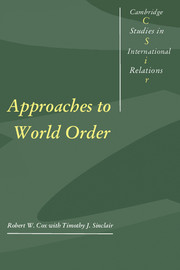Book contents
- Frontmatter
- Contents
- Preface
- Acknowledgements
- Part I Overviews
- Part II Theory
- Part III Interpretations
- Part IV Multilateralism
- 16 The executive head: an essay on leadership in international organization (1969)
- 17 Decision making (with Harold K. Jacobson) (1977)
- 18 Ideologies and the New International Economic Order: reflections on some recent literature (1979)
- 19 Labor and hegemony (1977)
- 20 Labor and hegemony: a reply (1980)
- 21 Multilateralism and world order (1992)
- 22 Globalization, multilateralism, and democracy (1992)
- Complete bibliography of works by Robert W. Cox to 1995
- Index of names
- Index of subjects
- CAMBRIDGE STUDIES IN INTERNATIONAL RELATIONS
19 - Labor and hegemony (1977)
Published online by Cambridge University Press: 05 June 2012
- Frontmatter
- Contents
- Preface
- Acknowledgements
- Part I Overviews
- Part II Theory
- Part III Interpretations
- Part IV Multilateralism
- 16 The executive head: an essay on leadership in international organization (1969)
- 17 Decision making (with Harold K. Jacobson) (1977)
- 18 Ideologies and the New International Economic Order: reflections on some recent literature (1979)
- 19 Labor and hegemony (1977)
- 20 Labor and hegemony: a reply (1980)
- 21 Multilateralism and world order (1992)
- 22 Globalization, multilateralism, and democracy (1992)
- Complete bibliography of works by Robert W. Cox to 1995
- Index of names
- Index of subjects
- CAMBRIDGE STUDIES IN INTERNATIONAL RELATIONS
Summary
The issues examined here concern the relationship between the International Labor Organization (ILO) and the United States. None of the events considered has been of great intrinsic importance to the course of world affairs, though some have been of symbolic importance and the significance of symbols in political and social life must not be underrated. Participants in the ILO have said the issues are about “tripartism,” evoking the principle of trade union and employer freedom from government control. Academic discussion of the ILO has hinged on “functionalism,” a more esoteric reference to the potential for international integration deriving from autonomous social forces. Both concepts express the normative preference of the users, but are inadequate and inaccurate representations of basic social and political power relations. An effort to gain a more valid sense of these power relations must take account of changes in world production processes and in the social relations that arise in these processes, changes that will be seen as linked to the emergence of a corporative form of state with different manifestations in developed and underdeveloped countries. These basic relationships can, in turn, be seen as conditioning the problematic of economic and social development, the nature of American power in the world, and the contemporary process of international organization. The ILO's current predicament becomes something less interesting for its own sake than as a thread enabling us to trace these deeper tendencies. It becomes the occasion, not the real subject matter, of the enquiry.
- Type
- Chapter
- Information
- Approaches to World Order , pp. 420 - 470Publisher: Cambridge University PressPrint publication year: 1996
- 2
- Cited by

